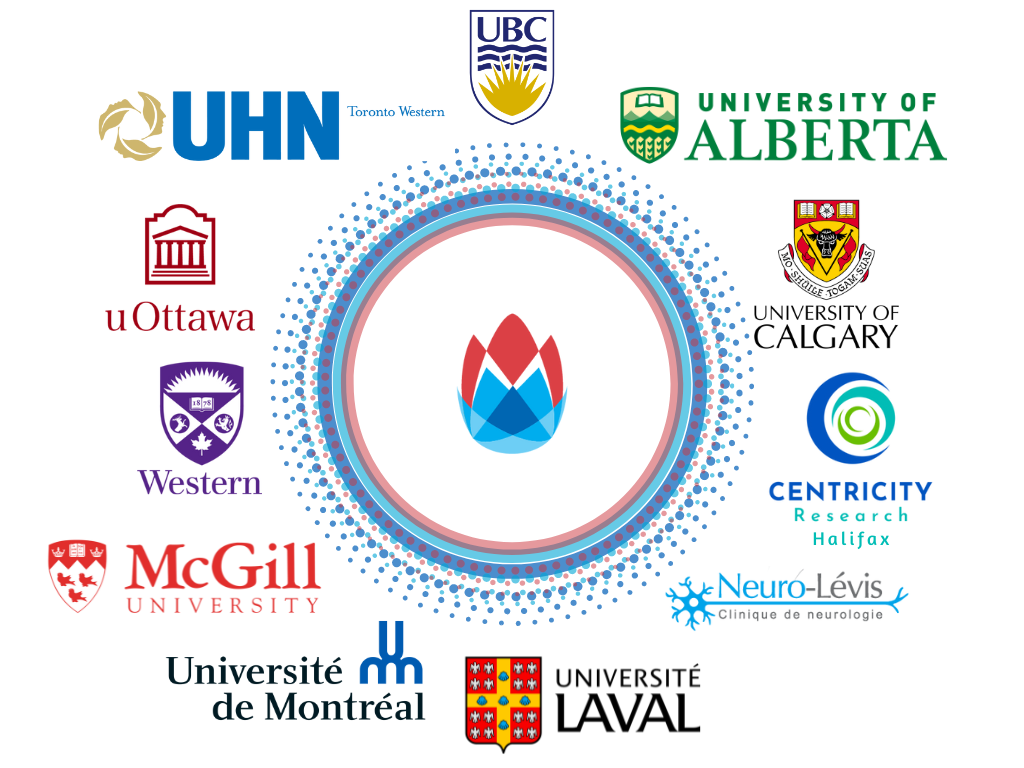Infrastructures
National Registry
Led by Dr. Camicioli, Dr. Dupré, Dr. Grimes, Dr. Lafontaine, Dr. Maestre, Dr. Martino, Dr. McKeown, Dr. Miyasaki, Dr. Panisset, Dr. Strafella.
A unified national registry to facilitate collaborations between researchers and participants on large-scale projects and clinical trials across Canada.
De-identified Database
Led by Dr. Evans, Dr. McKeown, Dr. Camicioli.
A large database containing demographic, medical, and cognitive information from participants over time to enable researchers to support cutting edge scientific investigations. This will also include imaging and second-generation wearable device data.
Biorepository
Led by Dr. Gan-Or, Dr. Park, Dr. Rouleau, Dr. Schlossmaker.
A research bank of biological specimens (example: blood) that can be used for a variety of analyses (including genetic) by the Canadian scientific community and beyond.
Sites
Canadian Open Parkinson Network Sites
C-OPN includes 11 major Movement Disorders programs across 5 provinces. The 11 centres include:
[CONSIDER INTRODUCING MAP IMAGE /MAP AS NAVIGATION TOOL HERE]
- The CaPRI/Movement Disorders Brain and Mental Health team of the Hotchkiss Brain Institute and the linked Movement Disorders program at the University of Calgary (main coordinating site)
EN: https://capriresearch.org/
EN: https://www.ucalgary.ca/dcns/programs/movementdisorders
EN: https://hbi.ucalgary.ca/our-research/healthy-brain-aging
2. The Pacific Parkinson Research Centre (University of British Columbia, UBC Hospital)
EN: https://www.centreforbrainhealth.ca/clinics/movement-disorders
- The Movement Disorders program (University of Alberta)
EN: https://www.ualberta.ca/department-of-medicine/movement-disorders
EN: https://www.ualberta.ca/department-of-medicine/movement-disorders/research
- The Movement Disorders Centre at the Toronto Western Hospital (University Health Network, University of Toronto)
EN: https://www.uhn.ca/KNC/PatientsFamilies/Clinics_Tests/Movement_Disorders
EN: https://www.uhnresearch.ca/division/13835
- The Parkinson Research Consortium (Ottawa University)
EN: https://www.ottawahospital.on.ca/en/clinical-services/deptpgrmcs/clinics-and-services/movement-disorders/
FR: https://www.ottawahospital.on.ca/fr/services-cliniques/deptpgrmcs/cliniques-et-services/clinique-des-troubles-du-mouvement/
EN: http://www.ohri.ca/prc/
FR: http://www.irho.ca/crp/
- L’Unité des Troubles du Mouvement André Barbeau (Université de Montréal)
FR: https://repertoire.chumontreal.qc.ca/fiches/troubles-du-mouvement
FR: https://www.chumontreal.qc.ca/crchum/axes-de-recherche
EN: https://www.chumontreal.qc.ca/en/crchum/research-themes
- The McGill Parkinson Program at the Montreal Neurological Institute and Hospital (MNI/H) and the Montreal General Hospital (McGill University)
EN: https://www.mcgill.ca/neuro/patients-visitors/clinics-and-health-care/movement-disorders
FR: https://www.mcgill.ca/neuro/fr/patients/cliniques-and-soins-de-sante/troubles-du-mouvement
EN: https://www.mcgill.ca/neuro/people/field_mprofile_research_areas/neurodegenerative_disorders
FR : https://www.mcgill.ca/neuro/fr/people/field_mprofile_research_areas/neurodegenerative_disorders
- La Clinique des Troubles du Mouvement du Centre Hospitalier Universitaire de Québec (CHU de Québec -Université Laval)
FR: http://www.crchudequebec.ulaval.ca/recherche/axes/neurosciences/
EN: http://www.crchudequebec.ulaval.ca/en/research/axis/neuroscience/

